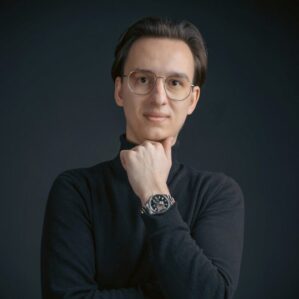 Piotr Lazarek, a M&T’25 alumni from Poland, won the 2025 President’s Sustainability Prize for Nirby, a real-time farmland management system addressing inefficiencies in fertilizer usage. We sat down with him to find out more about how he’s using satellites, drones, and AI for more sustainable and efficient agriculture.
Piotr Lazarek, a M&T’25 alumni from Poland, won the 2025 President’s Sustainability Prize for Nirby, a real-time farmland management system addressing inefficiencies in fertilizer usage. We sat down with him to find out more about how he’s using satellites, drones, and AI for more sustainable and efficient agriculture.
Q. Congratulations on winning the President’s Sustainability Prize for Nirby! Can you please tell us a little bit about what this award means to you?
PL: The President’s Sustainability Prize and the President’s Innovation Prize have been a dream of mine since freshman year. I’m grateful for all the support, mentorship and opportunity that Penn has given me. People say that this project changed my life, but they get it wrong. This project is my life. For a long time, I was afraid of dreaming big, but my parents always reminded me that anything is possible if I work hard enough. Receiving the President’s Sustainability Prize made me realize they were right.
Q: Can you tell us a little bit about Nirby?
PL: Nirby is a soil analytics and farmland management system designed to address the inefficiencies in fertilizer usage, contributing to more than 2.6 billion tons of CO2 emissions and costing farmers more than $75B annually. By integrating satellite data and drone-enabled soil measurements, Nirby provides farmers with real-time insights into field productivity and nutrient distribution. This approach enables the creation of precise fertilizer application maps, reducing fertilizer usage by up to 40% and increasing yields by up to 15%.
Q: How did you get the idea to develop Nirby?
PL: Around age 16, I heard a story in my chemistry class about a nearby farm that had suffered crop failure due to high levels of aluminum in the soil. I started asking my teacher questions about what happened and learned that farmers don’t perform laboratory soil testing because it’s time-consuming, expensive, and labor-intensive. I started thinking I could help local farmers and started working with a team of developers and engineers from Poland, where I grew up.
I continued working on the project when I moved to London for secondary school and began applying to universities. When I heard about the M&T Program, I shifted my goals of becoming an engineering to also becoming an entrepreneur.
Throughout the process, I had many conversations with farmers and kept hearing how they juggle dozens of discrete agricultural applications: one for inventory management, one for satellite analysis, one for precise agrotechnical treatments, and so on. Everything in this space is so disconnected. Companies are developing products – very specific solutions to only a very small spectrum of the entire problem. What we wanted to build was a full system that allows them to integrate everything within a single platform. We use satellite imagery from the European Space Agency to identify where inefficiencies are on the fields, then we deploy our autonomous drones that land at predetermined test points – guided by the satellite data – and test soil properties in real-time to identify why the inefficiencies have occurred. Finally, we generate precise application maps for fertilizers to tell farmers how to optimize their production. Nirby uses machine learning algorithms to determine key soil properties – such as nitrogen levels – and combines that with productivity insights from satellite data to create the most efficient fertilization plans.
Q: How is Nirby faring in the real world? What is the feedback you’re getting from farmers who are using it?
PL: Our fully operational Farmland Management Platform, which uses data to optimize crop production, has been utilized by over 200 farmers in Poland. We have received strong validation from both farmers and industry leaders, securing over 14 signed letters of intent from large-scale farms eager to adopt our system. Through our conversations with farmers, one recurring theme has become clear: the real problem isn’t just collecting data, it’s making it usable. Many farmers struggle with fragmented agtech tools, juggling multiple apps for satellite monitoring, soil testing, and machine integration, turning simple tasks into a full-time job. Nirby solves this complexity by seamlessly integrating soil testing, satellite data, and automated fertilizer recommendations in one place.
Q: How did the Penn M&T Program help you achieve your goals?
PL: Nirby has won more than 16 business competitions and raised more than $450,000 in non-equity funding. We are now preparing for our first investment round. The most important part of the M&T Program has been the mentorship. When I joined Penn, I wasn’t expecting that it would be so easy to reach out to world-class experts and leading minds in the field. But I got the best possible help in the world here, and I’m extremely grateful for it.


